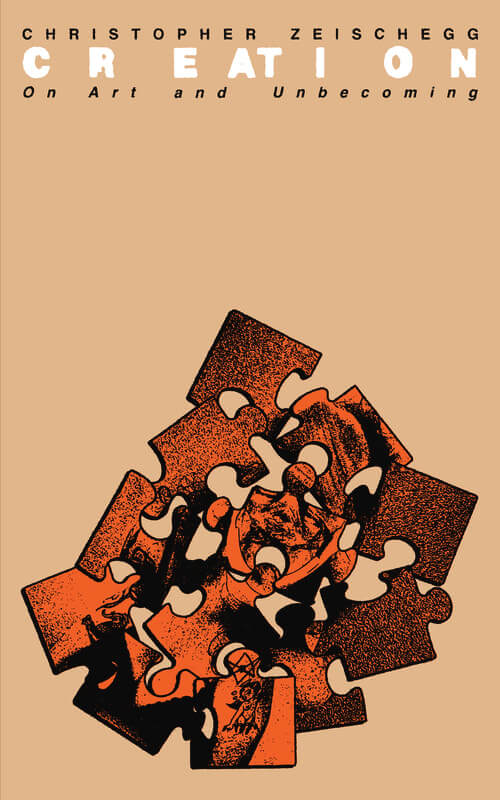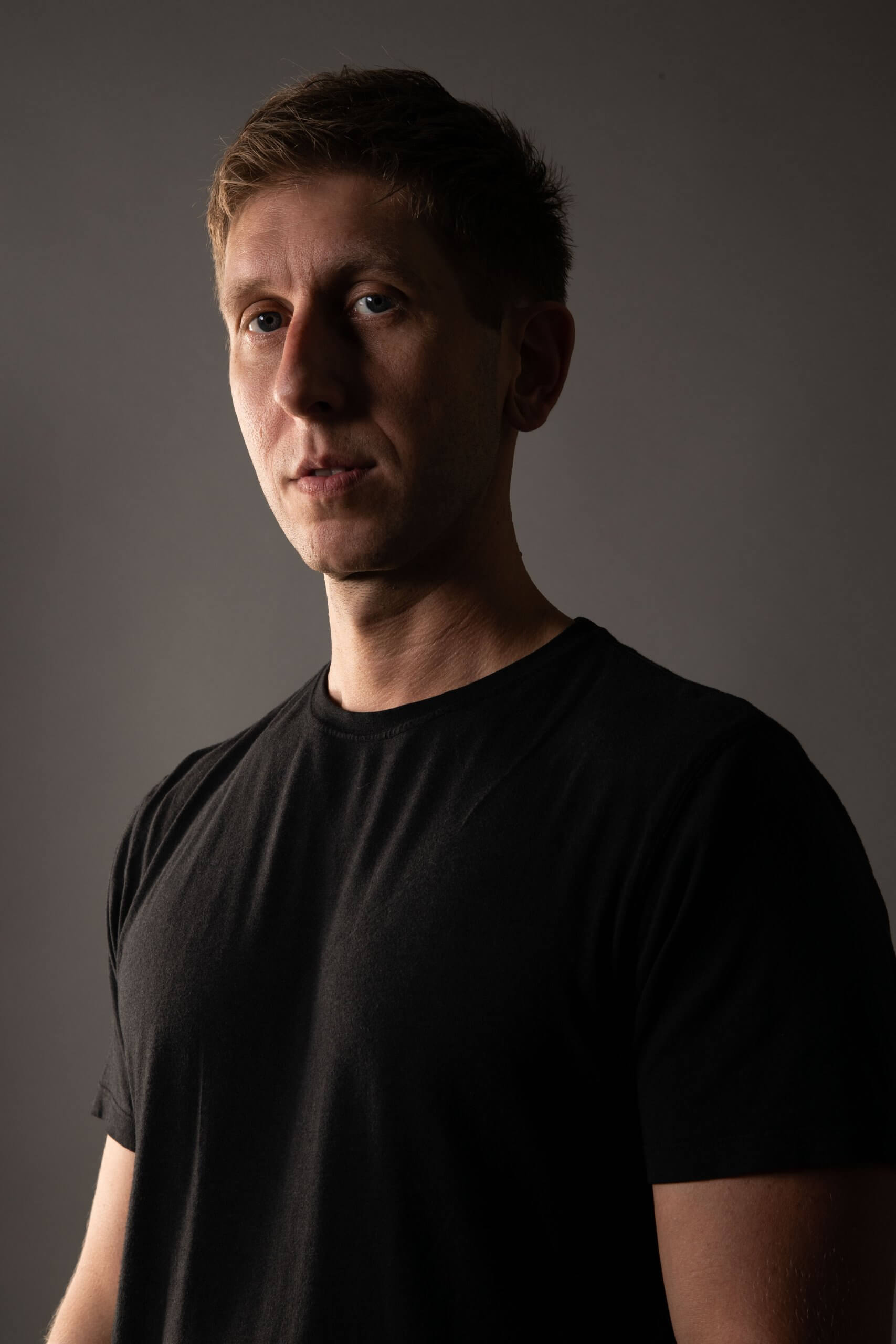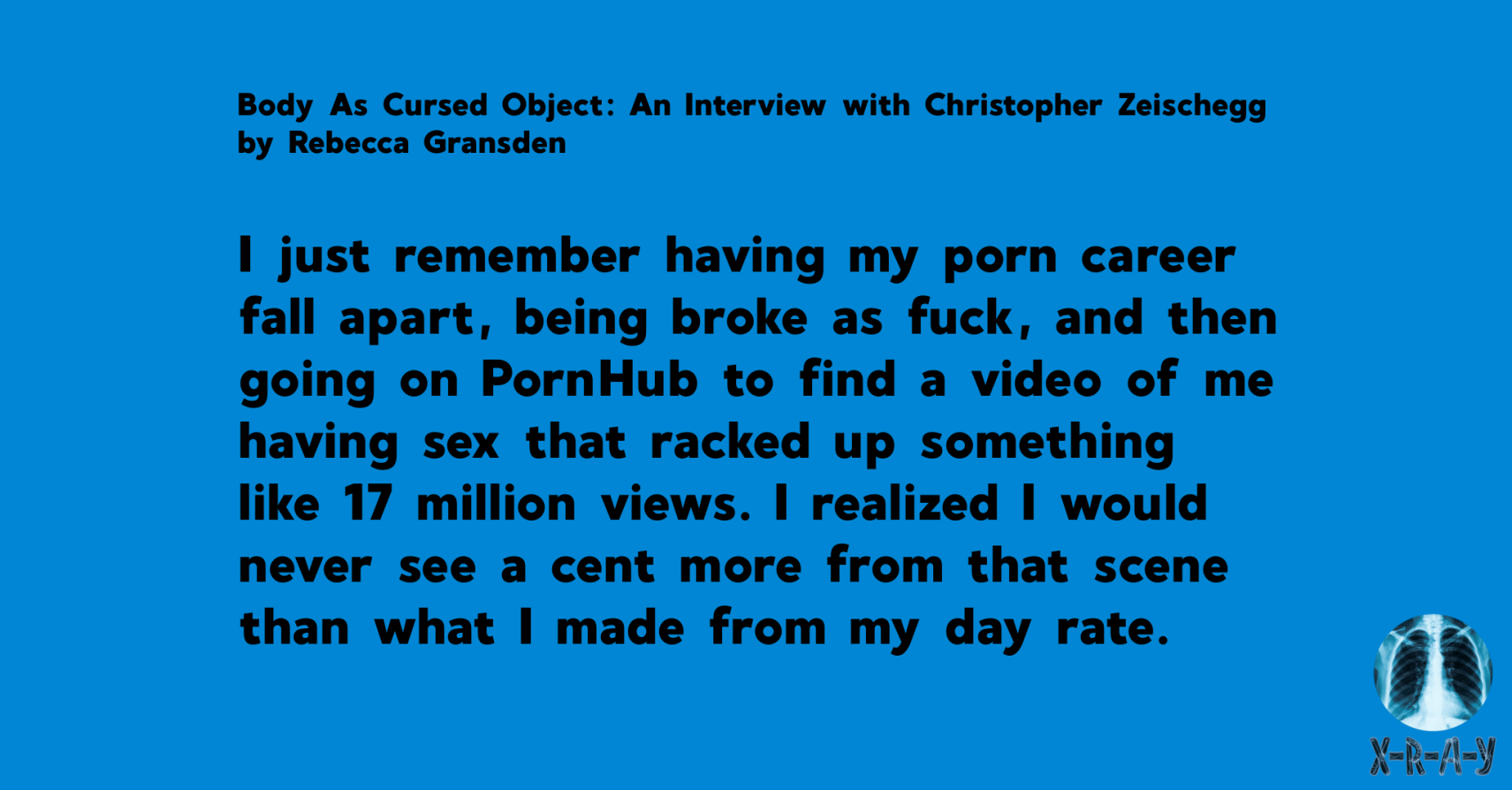 How do you know when you’ve arrived? Christopher Zeischegg’s Creation: On Art and Becoming (Apocalypse Party, 2024) presents the many violences we can inflict and invite, breathing breakneck life into fathomless yearning. In a series of essays and auto-fictional psycho-sexual fevers, Zeischegg delivers an examination of hunger. Appetite for sex and death, sure, but the book’s title points the way. One day will be the day of our death, and on that day we will have arrived at—something. If the fates back down and give us more time, it will be a day of becoming, like all days, like today. Zeischegg stalks this place in-between: on art, on extremity, on grace, and on coming out the other side. I talked to Christopher about the book.
How do you know when you’ve arrived? Christopher Zeischegg’s Creation: On Art and Becoming (Apocalypse Party, 2024) presents the many violences we can inflict and invite, breathing breakneck life into fathomless yearning. In a series of essays and auto-fictional psycho-sexual fevers, Zeischegg delivers an examination of hunger. Appetite for sex and death, sure, but the book’s title points the way. One day will be the day of our death, and on that day we will have arrived at—something. If the fates back down and give us more time, it will be a day of becoming, like all days, like today. Zeischegg stalks this place in-between: on art, on extremity, on grace, and on coming out the other side. I talked to Christopher about the book.
Rebecca Gransden: Several of the pieces you’ve chosen to include in the collection address grievances of some kind. What is your relationship to revenge and atonement?
Christopher Zeischegg: Regarding grievance…
If I’m to poke fun at myself, I could say that most of the stories in the book have to do with me complaining. I mention in the preface that I wrote a piece of autofiction about my father. He ended up reading the story, which I hadn’t considered a realistic possibility at the time.
My father called me up to confront me about what this all meant, as I’d included some mean or condescending bits throughout.
I tried to explain what I’d done in the context of autofiction (what that even meant), and in the context of other work I admired and was trying to reference – essentially a bunch of aesthetic jargon. At the end of our conversation, my father laughed and said that I just liked complaining. Maybe that’s true.
Regarding revenge…
The more sincere reference comes in an essay about my last novel, The Magician. I’m not going to get into all of it here, but the beginning of the book has to do with a chaotic relationship I had with a woman during my transition out of the porn industry. Let’s call her Andrea. Prior to moving in with me, Andrea lived in the guest house of an older man – essentially, her sugar daddy and drug dealer. The guy threatened to kill me on a number of occasions.
In retrospect, this sounds very stupid. But I think there were some performative plans, realistic or not, to kill the guy, who I blamed so many of my problems on. Obviously, that didn’t happen. And at the moment, I couldn’t give less of a shit about him.
The more contrived reference to revenge comes in the form of a love letter to Christopher Norris, the artist who designed my book cover. A while back, he’d asked me to write a short piece for the reissue of his experimental horror novel, Hunchback ’88. I penned a short story that treated his novel as a cursed object. I thought it would be fun to expand the piece for my own collection; to be extra mean about it; make fun of him and the things we’re both into but find embarrassing, like aging men who are into hardcore and graphic design or whatever.
The whole story is a joke, and ends with a nameless first-person-narrator murdering Christopher Norris. He loved it, so I think the piece was a success.
RG: The book’s preface begins with a reference to your father. How does this presence impact the collection?
CZ: I meant to draw attention to patterns in my work that no longer serve my life or relationships in the way I want. Plainly speaking, I wrote a story in a previous book that mentioned my father dying. A year later, he actually died of cancer.
I don’t necessarily regret the way I’ve incorporated friends, family, and other people from my life into autofiction, but it’s often been a provocation. I’m not sure I want to keep dabbling in that world, where there’s so much opportunity to hurt real people, or at least piss them off.
RG: The body takes its part in the book in a multiplicity of ways, highly complex and difficult to decipher. One aspect I found interesting is that of the body as a signifier, that it becomes divorced from its material and physical meaning simply by bringing attention to itself in those terms. In this way, it takes on the quality of an indicator, always pointing away from itself even as it is engaged in the most intimate of human acts. For someone as versed in the body and what that means as you’ve found yourself, how do you reconcile your own body, that you very obviously live with every day, and what the body means for your writing?
CZ: The more straight-forward reason I focus on the body in my writing is that my experience of life as a young adult was largely framed by sex work. I was a porn performer, cam boy, and to a lesser extent, hustler and so on. Most of how I related to people, in terms of how I learned to get what I want, or my conflicts with people, had to do with my body – how others perceive me and how I perceive myself.
At the same time, my interests and aesthetics were heavily defined by aggressive music subculture, like underground metal, and things like horror movies and (what used to be called) ‘transgressive’ film and literature. A lot of the material that shaped my youth was wrapped up in the language of violence, emotional chaos, and Satanic myth, or whatever you might call the language of early black metal.
Because of my youth, I understood how to parse emotional experience through violent metaphor. I also felt that the most interesting thing about me, for a long time, was that I fucked for a living. So, most everything I’ve written over the past fifteen years has started with those presumptions.

RG: We all invent ourselves. Your work deals with the question of facade, veneers, and the creation of persona. How have you utilized invention? Do you think about authenticity and does that have a bearing on your art?
CZ: I’m very self-involved, and up until recently, have had a difficult time writing outside my own experience.
Beyond that, writing has often been an act of problem-solving for me.
Again, I return to sex work as this monolithic experience of my twenties, which I have a difficulty describing in black and white terms. The fact that I was best known by my stage name, Danny Wylde, a moniker given to me by some gonzo porn company, that so much of my early sense of sexuality was shaped by other people’s direction and other people’s fantasy… I can’t help but be interested in shifting identities or personas while I try to get to the root of my own bullshit, or how I ‘authentically’ feel about anything.
RG: This is a necessarily reductive question, but who is Luka Fisher to you?
CZ: Luka Fisher is a close friend of mine. She’s also, in part, the subject of my new book, Creation: On Art and Unbecoming.
We met on a porn set over a decade ago. She was an extra in a zombie parody. I was at the height of my career as a XXX performer.
At the time, she was putting out a lot of collaborative zines, and she’d volunteered herself as an A&R rep for this indie label called Records Ad Nauseum. So, I think my interest in writing and music immediately overlapped with some of the projects she was involved with back then.
Luka wanted to produce all of these underground films, records, and performances, but would talk about them through the lens of having idolized old Hollywood producers, people who would implement unorthodox techniques or come up with insane publicity stunts. In retrospect, we both probably had some delusions of grandeur. But it was nice to spend time with someone like Luka, who had all of these big dreams. Especially around the time I felt my life was falling apart.
She and I began most of our work together on the heels of my porn career ending, which was one of the more chaotic times in my life. She was going through her own shit, and dealing with gender dysphoria and beginning to transition. I like to think that we offered each other support.
I wanted to include a few essays about her in my new book, to honor her, and to explain how she shaped my life in important ways.
RG: An idea that has lingered with me since reading the collection is that we choose to undertake relationships with those we can accept to receive hurt from. Even in the most functional relationships we will get burned at times, and when it comes to artistic partnerships, especially ones that endure, there will be incidences of wounding, whether intentional or not. Has your perspective on the connections you have to others shifted as you’ve matured, and if so, how is that represented in the collection?
CZ: Well, the relationships in the book – aside from my real-world relationship to Luka – are mostly fantastical extensions of my transactional affairs. No one really gets what they want; the sex, for example, is a bummer, either explicitly violent or a letdown.
In reality, I do feel I have the capacity for gratifying relationships, more so than at any other point in my life. At the same time, I’m less open to artistic collaboration. I simply don’t have the patience to deal with other people’s meanderings.
I’m often hesitant to discuss my marriage in a public space, because I find my relationship to my wife sacred and don’t want to exploit that as spectacle. But I think our dynamic is relevant here. My wife is probably the most ambitious visual artist I know. We both have immense respect for each other, artistically and otherwise. We also have a rule that we don’t work on each other’s projects, at least not in a creative capacity. If she has a technical question regarding compositing software, I’ll help her out. Or she’ll take my author photos. But our work is our own, and our visions are extremely specific. Any collaboration on that front would turn into a fight.
More broadly, I’m getting older and have more of a sense of what I’m good at and where I’m lacking. And I’ve embraced a certain mentality in terms of interacting with other people in an artistic capacity. Meaning, I’m nearly 40 years old. Anyone I consider a peer, who I respect, who I think could add something to whatever I’m doing, has been working on their craft for at least a decade. If I want their help, I better be able to pay them or at least offer them something useful in return. Otherwise, I feel this will turn quickly toward resentment.
RG: In ‘On the Moral Imperative to Commodify Our Sexual Suffering,’ you make sobering points regarding the adult entertainment industry. Here, it is suggested that the promotion and normalization of porn that has taken place at a cultural level has broken down the business model – when scarcity becomes plenty there is a downgrading of value. This has led to the situation where those who proselytize sex positivity have put sex workers out of business. Familiarity and overstimulation also create numbness and boredom for the sex act itself, where all novelty in sex is eradicated. It’s a world that provokes ambivalent feelings. The issue is a wide one, but have you gleaned any lasting conclusions from your time spent immersed in the lifestyle?
CZ: In full transparency, the piece is a bit dated. I think I first wrote that in 2015, prior to the popularity of platforms like OnlyFans, and prior to PornHub changing their business model to include revenue sharing with content creators.
That said, my feelings haven’t changed much, albeit they’re less severe than what’s portrayed in that story.
Anyone who creates ‘digital content’ in 2024 probably operates with some cognitive dissonance. It’s easier than ever to make stuff. But it’s probably harder than ever to stand out or make any significant money from selling digital media, porn included.
From my vantage point, porn as an artform is complete bullshit. It’s not art. Of course, there are many examples of films that have attempted to imbue it with some kind of aesthetic or ideological significance. And every so often, I have a conversation with someone who wants to make elevated, artistic porn – as if this hasn’t already been attempted a million times over. It never works.
When your body is aroused, you’re not interested in aesthetics, other than the aesthetics of the body (i.e. Am I attracted to the person in front of me?). Part of your brain becomes stupid. So, if you’re thrust into an aesthetic environment, where you’re interested in narrative, composition, lighting, etc… and then you’re introduced to hardcore sex for more than a minute or so, you’re either going to get turned on and forget about everything else. Or you’re going to get bored.
So, for me, the purpose of porn and sex work is explicitly financial.
I’ve worked on so many ‘feminist’ porn sets or films where there’s some progressive ideology attached to the production. It’s often just as good or bad as working on any other movie. What’s the actual difference in the experience? Maybe there’s more progressive language used by the director. Or maybe there’s more oat milk on set.
Typically, the days are longer without any kind of pay bump. And I’ve been fucked over financially more often by directors who boast some kind of ideology, usually because their utopian vision knocks up against the reality of how few people actually give a shit.
I don’t have a strong grasp on how the market functions these days. I just remember having my porn career fall apart, being broke as fuck, and then going on PornHub to find a video of me having sex that racked up something like 17 million views. I realized I would never see a cent more from that scene than what I made from my day rate.
I’m not special. Most people in most jobs are going to hit a point where they realize their complete and utter lack of value. You can either fall apart and get into socialist cosplay or whatever. Or you adapt.
It took me about ten years to figure out a different path, and it’s still a struggle. But I make more money now. And my clients aren’t trying to fuck me, figuratively or otherwise.
RG: The end of the collection allows for an element of self reflection, and at one point, in reference to themes to which you cycle back, you say you are repeatedly “writing myself as a piece-of-shit hooker who dies.” Looking back on the collection, the time it was inspired by, and the writing of it, what is your opinion on the repetition now?
CZ: The essay at the end of the book is the most recent addition to the collection. I wrote it last year, during the summer of 2023, right before my friend, Luka, went into gender affirming facial feminization surgery. I’d talked to her about wanting to include some essays about her in the book. She suggested we take photos of her, bruised and bandaged, after surgery and use them for the cover. It’s a bit hard to tell now because of the graphic element; she’s separated into puzzle pieces. But her face is the main feature of the cover.
This is relevant because I wanted the book to suggest a kind of transformation. Not that my experience has anything to do with issues around gender. But Luka was crucial to the book’s narrative, so I found it appropriate to use her image in that context.
Anyway, during my conversations with Luka, I told her that I considered it a failure on my part to write another book like this. I’ve published three novels, a sort of porn memoir, and now a short story collection. They’re all more-or-less about the same thing. A porn guy or hustler, loosely based on me, is depressed and doesn’t get much of what he’s after. Then, he gets brutally maimed or dies. I mean, I hope they’re a little bit more complex than that, but…
It was probably important for me to write those books, to work through whatever I was feeling about those experiences. But I don’t want to get stuck there, to spend the next 10 years, or the rest of my life, waking up most mornings to revisit that material, to recycle my own trauma, or even loop the stuff I look back on fondly.
Ultimately, I can’t escape the things I’m interested in, my thought patterns, etc… But I’m at least going to make a conscious effort NOT to write another book about a porn guy named Chris. Put him in the grave already.

